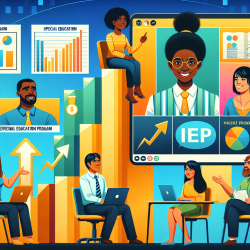Introduction: The Power of Preparation
As parents and guardians, attending Individualized Education Program (IEP) meetings can often feel overwhelming, especially when compounded with the pressures of special education funding and the desire to ensure the best outcomes for your child. With a focus on data-driven decisions, this blog aims to provide you with the knowledge and tools to approach these meetings with confidence and clarity.
Understanding the IEP Process
IEP meetings are a collaborative effort between parents, educators, and specialists to create a tailored educational plan for children with special needs. These meetings are crucial in identifying the resources and support necessary for your child’s success. Here are some key components to focus on during the meeting:
- Current Performance: Review data on your child’s current academic and social performance.
- Goals and Objectives: Set measurable goals that are specific, achievable, and time-bound.
- Support Services: Discuss the services your child will receive, including any telehealth options available.
- Progress Monitoring: Establish how progress will be tracked and communicated.
The Role of Telehealth in IEPs
Telehealth has revolutionized the way services are delivered in special education. Online therapy jobs are increasingly becoming a part of IEPs, providing flexibility and access to specialized services that may not be available locally. Here's how telehealth can benefit your child:
- Accessibility: Access to a wider range of specialists and services regardless of geographical location.
- Convenience: Sessions can be scheduled at times that are most convenient for your family.
- Consistency: Regular sessions help maintain continuity of care and progress.
Maximizing the Impact of IEP Meetings
Preparation is key to a successful IEP meeting. Here are some tips to help you prepare:
- Gather Data: Collect any relevant information or assessments about your child’s progress and challenges.
- Ask Questions: Don’t hesitate to ask for clarification on any aspect of the IEP or the services being offered.
- Be an Advocate: Ensure that your child’s needs are fully represented and considered.
- Follow Up: After the meeting, review the IEP document and confirm that it accurately reflects the discussion.
Conclusion: Empowering Your Child’s Future
By approaching IEP meetings with a data-driven mindset and utilizing the benefits of telehealth, you can be a powerful advocate for your child’s education. Remember, you are not alone in this journey; there are resources and professionals ready to support you every step of the way. Together, we can create an environment where every child has the opportunity to thrive.










